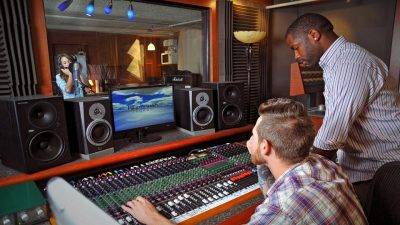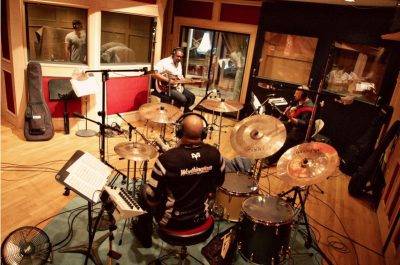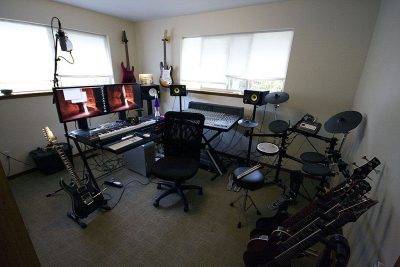3 Reasons Why Pre-Production Is Essential
3 Reasons Why Pre-Production Is Essential
- Understanding The Material

The unfortunate result of blindly recording a band is not having prior knowledge of the song that you’re working with. As modern day producers, it’s our job to take their song and make the right decisions to ensure we’ll achieve the exact sound that fits. This is why I believe Pre-Production is the most important step in the recording process. It gives you the invaluable opportunity of not only choosing the right gear should be used in the final recording, but also allows you to understand the material on a deeper level. You get to listen back to the song objectively and listen for parts that need improvement, removed, or expanded upon.

For example, let’s say a band records a song that has an energetic sounding verse. The drums are fast, there’s a lead guitar melody, etc. Then the chorus comes in and it feels like there’s no change in energy. The drums stay the same pace and no layers are added. The benefit that Pre-Production gives you in this situation is you get to activate your producer role and think of new elements that could be changed or added to that chorus to make it “pop”. You could add a vocal stack, synth pads, or more lead guitar parts. The options are endless, but the idea is that you have the chance to fix these things before the real recording session takes place.

In an another example, let’s say you finished recording the drums, bass, guitars, and all you start recording the vocals. The vocalist begins recording and everyone suddenly realizes that a certain section is too slow. If this were the final recording, it would be too late. Everyone would just have to suck it up and realize that’s how it’s going to be. This an extremely common example of an adjustment that could be made to make the real recording better. I could go on and on with an uncountable amount of examples, but the point is all of these things have the ability to be altered in Pre-Production, and eliminating these regrets are the most important thing to mention to your client when pitching the option to them.
- Working With the Budget

The most common response I hear when a band refuses to do pre-production is that they can’t afford the extra time. While this is a valid excuse for a band working with a budget, there are a couple options you can give them to make it something they can work with.
- a) Offer Special Deals for Pre-Production
You always want to get paid appropriately for your time, without question. But if you’re like me, you’re willing to make a necessary compromise to get the best product possible. For example, I keep spare guitar strings in the studio for bands that refuse to buy new ones themselves, because I know I may be out $20, but that’s an investment that I’m personally making to ensure the best quality. So when it comes to Pre-Production, if they can’t afford your original offer, make a deal with them. If they can’t work with your lowest offer, then don’t sacrifice too much, but odds are if you give them something like a flat rate deal they’ll find a way to make it work, especially if you explain why it’s so important.
If you’re not willing to do give them a discount for it, then there are ways to make it a quicker process so it takes less time. Try setting up a simple live-rig (2 mics on the drums, DI bass, one mic per guitar). This isn’t an ideal scenario for a lot of genres like metal and pop-punk, but this way they could just play through their songs in a couple hours and be in-and-out. It won’t be as clean of a recording, but you’ll still have a great reference to analyze the material and figure out the adjustments needed.
- b) Record the Demos Themselves or with a Cheaper Studio.

Ask if one of the members has a small recording rig of their own. A growing amount of musicians are buying their own small interfaces and software, and they could be utilizing these tools to record their own bands demos. I’ve found most of them are the guitarists who use it to document their own riff ideas, but if they have even just one microphone, they could record the drums with them and overdub the instruments. It obviously won’t be the best quality to work with, but it will be something to give you a better idea of what to expect. In fact, they’ll probably have many “ah-ha” moments of their own in the process. This is not the ideal process and should be a last resort idea, but it will still give everyone involved that chance to know what needs to be done before the real recording session.
If they can’t record themselves but also can’t afford to go to you, the final option would be to find a cheaper studio for them to do pre-production. It’s unfortunate that you wouldn’t see any of the profits from this scenario, but what you don’t gain monetarily, you gain in knowledge and reference material. In the long run, this will make the final product better (which is the most important thing), and will most certainly help your reputation.
- Get More Confident Performances

After Pre-Production is finished, not only will you have the opportunity to analyze the song as a producer, but your client will have revised material to practice to. Let’s say one of the adjustments that needed to be made was slowing down the tempo of a song. If it was a drastic enough change, it’s important that the band spends time practicing the song to the new tempo. If they aren’t used to that tempo, their body will continue to try to perform at the previous tempo and the takes will sound hesitant and lacking in confidence. The benefit of recording the pre-production is now everyone can begin the real recording knowing exactly what to expect, and record the takes with the most confidence.
Bottom line, whether you’re a musician or a producer, pre-production is absolutely essential to get the best product possible. You have the opportunity to hear the songs back, expand on them to make them sound complete, learn the songs prior to recording so that everyone involved knows exactly how to approach the song. Don’t have another situation where your clients gets their final mixes back and has a long list full of regrets. Stress to them that the small amount of extra money and time is worth it, knowing the larger amount be they’ll be spending on the recording will be worth it for everyone involved.
Discover more from Making A Scene!
Subscribe to get the latest posts sent to your email.














































